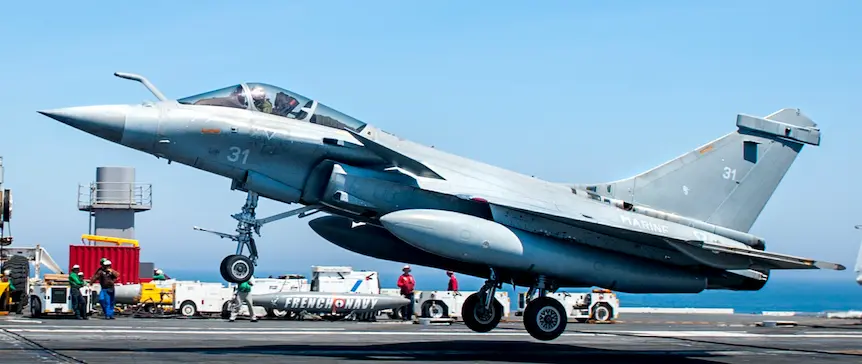
India reviews IAF’s ₹2 lakh crore Rafale jet proposal, a strategic push for air dominance and self-reliant defence manufacturing under Aatmanirbhar Bharat
India is preparing for one of its biggest defence upgrades ever. The Defence Ministry has started reviewing a proposal from the Indian Air Force (IAF) to acquire 114 ‘Made in India’ Rafale fighter jets. Valued at over ₹2 lakh crore, this deal could reshape India’s air power and boost domestic defence manufacturing.
What Is the Rafale Deal and Why It Matters
India’s Sky Leap: Defence Ministry Reviews IAF’s ₹2 Lakh Crore Rafale Deal – The Indian Air Force has formally submitted a proposal to the Defence Ministry to buy 114 Rafale fighter jets. These aircraft will be built in India by Dassault Aviation, the French aerospace company, in partnership with Indian firms like Tata Group. The proposal includes over 60% indigenous content, making it a major step toward self-reliance in defence under the Aatmanirbhar Bharat initiative.
If approved, this would be India’s largest-ever defence procurement, surpassing previous deals in both scale and strategic importance. The Rafale jets are known for their:
- Advanced electronic warfare systems (Spectra suite)
- Long-range air-to-ground missiles
- Superior maneuverability and radar capabilities
- Combat-tested performance, especially during Operation Sindoor, where they outclassed Chinese PL-15 missiles
India already operates 36 Rafales, and the Navy has ordered another 36. This new batch would take the total to 176, forming a strong backbone alongside Su-30 MKIs, LCA Tejas Mark 1A, and the upcoming fifth-generation indigenous fighter jet planned for induction after 2035.
Made in India Rafales: A Boost for Domestic Industry
One of the most exciting aspects of this deal is its focus on local manufacturing. More than 60% of the components and systems will be produced in India, involving:
- Indian aerospace firms for airframe and avionics
- Hyderabad-based MRO facility for Rafale’s M-88 engines
- Tata Group and other private players for assembly and logistics
This will not only create thousands of skilled jobs but also strengthen India’s defence industrial base. The move is expected to:
- Reduce dependence on foreign imports
- Improve maintenance and upgrade capabilities
- Encourage innovation in aerospace technology
- Attract global investment in Indian defence startups
The Defence Ministry’s review includes input from Defence Finance, the Defence Procurement Board (DPB), and eventually the Defence Acquisition Council (DAC). If cleared, the deal will be a landmark in India’s journey toward becoming a global defence manufacturing hub.
Strategic Timing: Why India Needs These Jets Now
This proposal comes at a time of rising regional tensions and evolving security threats. India faces challenges on multiple fronts:
- Border tensions with China in Ladakh and Arunachal Pradesh
- Unstable relations with Pakistan, especially after recent airspace violations
- Growing drone threats and hybrid warfare tactics
The IAF urgently needs to modernize its fleet to maintain air superiority. Many of its current aircraft are aging, and the induction of new Rafales will:
- Strengthen India’s quick response capability
- Improve interoperability with naval and ground forces
- Enhance deterrence against hostile neighbors
- Support long-range precision strikes in case of conflict
The Rafale’s performance in recent operations has proven its value. Its ability to evade radar, jam enemy signals, and deliver high-impact strikes makes it a key asset in modern warfare.
What Happens Next: Review, Approval, and Production
The Defence Ministry has received the Statement of Case (SoC) from the IAF and is currently reviewing it across departments. Here’s what the process looks like:
- Internal Review: Defence Finance and technical wings assess cost, feasibility, and strategic value.
- Defence Procurement Board (DPB): Headed by the Defence Secretary, this board will evaluate the proposal in detail.
- Defence Acquisition Council (DAC): Final approval authority chaired by the Defence Minister.
- Contract Negotiation: If approved, India and Dassault Aviation will finalize terms, timelines, and production plans.
- Manufacturing Begins: Indian firms will start building components, with full assembly expected to begin within 24-36 months.
The first batch of ‘Made in India’ Rafales could be ready by 2028, with full delivery expected by 2032. The deal also includes training programs, technology transfer, and long-term maintenance contracts.
Final Thought
India’s proposal to acquire 114 ‘Made in India’ Rafale jets is more than a defence deal, it’s a statement of intent. It reflects a nation ready to defend its skies, empower its industries, and lead with innovation. As the Defence Ministry reviews this historic proposal, the country watches with hope, pride, and anticipation.
Also read: 114 Rafales for India: A Controversial Gamble for Dassault Aviation
Stay informed with the latest news and updates – only on Rapido Updates.
1 thought on “India’s Sky Leap-Air Power Boost: Defence Ministry Reviews IAF’s ₹2 Lakh Crore Rafale Deal”
Comments are closed.